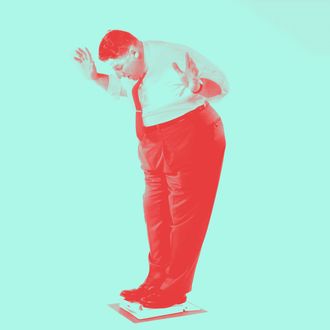
Within the general category “trying to lose weight,” there is a huge range of behaviors. Some people take this quest very seriously, diligently tracking seemingly every category down to the bite. Others see it as a more general long-term goal, but one that doesn’t end up hugely affecting their day-to-day life. It’s not surprising that this latter group tends to be less successful in their efforts, and a new study in PLOS ONE led by Elina Helander from Tempere Univeristy of Technology in Finland (and co-authored by friend of Science of Us Brian Wansink) makes the case for a vigilant approach to weight loss, at least when it comes to weigh-ins.
As the press release explains, “The researchers analyzed 2,838 weight measurements (up to a year’s worth of weigh-ins) from 40 overweight individuals (with a body mass index of 25 and over) who indicated that weight loss was a personal goal or concern.” They found a correlation between how frequently the study participants weighed themselves and how much weight they lost, and that “The average time that participants could go between weighting without gaining weight was 5.8 days or about a weekly weigh-in.”
The usual correlation-causation caveats apply here: It could be that the people most serious about losing weight, and better about exercise and diet, simply weighed themselves more. But this finding does tie into other evidence suggesting this sort of accountability matters when it comes to weight loss, a long-term goal with daily opportunities for slip-ups. So if you’re trying to slim down, find a good scale and keep it nearby.

